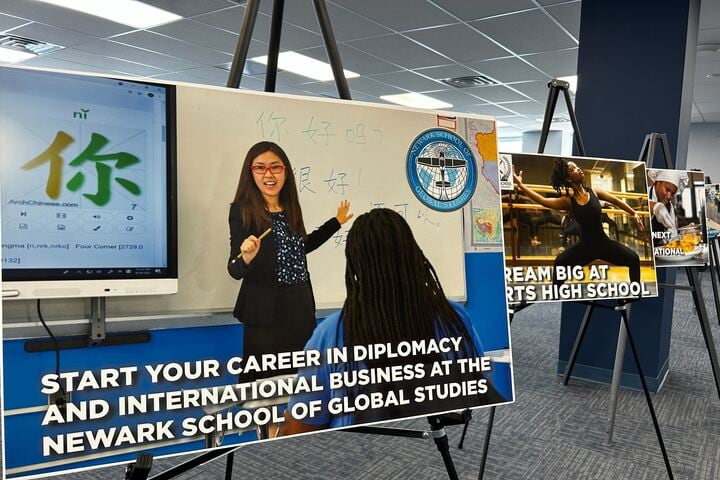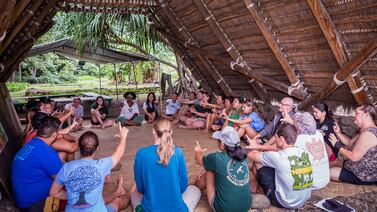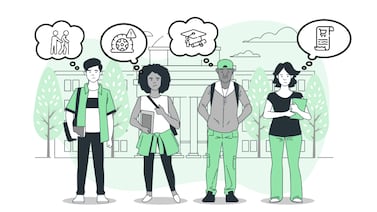A review of the racial, cultural, and religious dynamics at Newark’s School of Global Studies is meant to help the district design a strategy to tackle racial issues in city schools, said Superintendent Roger León.
The review, conducted by consulting firm CREED Strategies, began in January and is the first mention of the district’s long-awaited plan to mend problems at the high school after incidents of racial harassment surfaced last fall. CREED Strategies is led by Dr. Lauren Wells, Newark Mayor Ras Baraka’s former chief education officer whose firm also helped create NPS Clarity 2020, the district’s one-year plan laying the foundation for change in schools after returning to local control.
But details about the firm’s analysis of Global Studies and its recommendations will not be made public, said León, speaking at a press conference on Thursday.
León offered few details about the report, which he said remains under review and is meant to serve as “an internal document for us to consider.”
Global Studies, which first opened its doors in 2020 welcoming ninth graders, has been promoted as a high school offering a global perspective where students could study different cultures and prepare to study abroad.
“We found it to be quite a problem that the school that we had created to show everyone the way was actually mirroring the problems that are in the way,” León said.
Last November, students at the Newark School of Global Studies spoke publicly about their experiences of racial harassment and abuse during their time there. The tensions led several students to transfer and some teachers to resign.
In response, the district said it was working on taking “corrective action” at the school but has not shared specific details about its plan.
Thursday’s update was the first glimpse into the district’s efforts to fix long-standing racial issues that drew heavy criticism from parents, students, and advocates about the way the school and district leaders handled the situation. The incidents also garnered attention from Baraka, who met with students in December and hosted a town hall in March to discuss unity among Black and brown communities.
The district’s partnership with CREED Strategies includes a research and data-sharing agreement that launched a study of the events at the high school last fall as well as interviews with students, parents, and teachers “who have been victims of racial, cultural, and/or religious incidents,” according to the agreement approved in January by the board.
León did not disclose details of the group’s review or findings on Thursday but said “three recommendations that were shared” are on par with what the district is doing to fix the problems. He also said the district would need to “procure other experts to really help us understand how to address particular issues.”
District leaders are currently reviewing the report and will meet with Wells and her team following revisions to the document, León said.
As the district works on developing strategies to address the racial issues, León wants to “tap the students at Global Students” to work with him and help inform the district’s strategy. The district is listening to students about these and other issues, León added, and is working to promote trust and honesty among them.
“If there are issues occurring in other schools, how do students activate that voice? What is the adult response that we need to have?” León added.
Students, staff, and parents at the center of the incidents grew increasingly frustrated at what they say was an initial lack of response from the high school’s administration, including principal Nelson Ruiz. At least one parent called for the removal of Ruiz but he has remained in his role since.
During Thursday’s press conference, León said he would also call on Ruiz to help other principals deal with similar issues at their schools and provide guidance as needed.
“So, his role will not only be to be the principal of a school, but also to help his colleagues in discussing these types of conversations, which must be addressed at all times,” León added.
Board members also said they have not reviewed the draft report from CREED Strategies. During June’s regular school board meeting, board vice president Dawn Haynes said she was expecting to hear an update on the report, which was brought up during June’s legal and governance committees that are closed to the public.
“It is a hot topic item that pretty much everybody on this dais is expecting to see some results from,” Haynes said. “To know that we put that in place as the board and we’re expecting some information based on it, a synopsis, the actual report, what are the beginning findings? It is imperative that that information gets to the board.”
Jessie Gomez is a reporter for Chalkbeat Newark, covering public education in the city. Contact Jessie at jgomez@chalkbeat.org.








